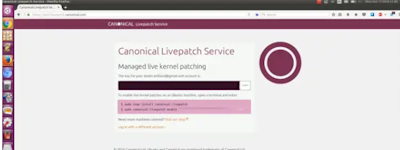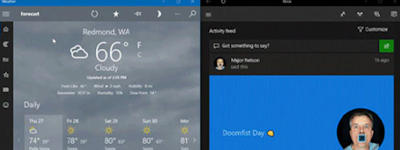17 years helping Australian businesses
choose better software
Red Hat Enterprise Linux
What Is Red Hat Enterprise Linux?
Redhat Enterprise Linux is an open-source operating system that can be run on multiple platforms to handle large quantites of data. The system comes with an image builder that IT teams can use to create edge-optimized OS images.
Who Uses Red Hat Enterprise Linux?
Not provided by vendor
Not sure about Red Hat Enterprise Linux?
Compare with a popular alternative

Red Hat Enterprise Linux
Reviews of Red Hat Enterprise Linux

Alternatives Considered:
A secure, stable Linux distribution for robust and stable services
Comments: We currently use this distribution to manage interface services between LIS and clinical analysis equipment, which has been very useful since it is a stable system with good performance that knows how to take advantage of the assigned resources to manage tasks. secure, stable and above all manageable operating system
Pros:
What I like most about this distribution is how stable it can be once implemented. Also that it is very secure when it comes to data handling, vulnerability and unauthorized access, it is a distribution for server and business use
Cons:
That it is a complex distribution as far as the user is concerned, it is not for users with little experience, but for advanced users of linux
Alternatives Considered:
Best Linux for Enterprise applications
Comments: It's easy to use and you will get every possible support. Overall the best OS for application development.
Pros:
The support from the red hat enterprise is very good. The enterprise-level features offered by RED HAT ENTERPRISE LINUX makes it one of the best candidate for enterprise applications. The memory management is quite well and it is almost compatible with every major enterprise-level software available in the market.
Cons:
The GUI and support can be improved. Different official customizable GUI should be available. Official RHEL Desktop (GUI) container should be made available.
Strong platform Oerating system
Pros:
It's an open source, Kernel is good, This is safe and secure OS. OS installation is very easy also. Easy to understand, Services installation process are easy and commands are understandable also.
Cons:
I have been using this OS on server level since from long time. I have faced OS Stuck (Lack) issues many times. Faced the lacking issue same more time while uninstalling any Program or services.
Redhat Enterprise Linux: A big name for Developing and Deploying Enterprise Servers
Comments: I realized very good performance when running client/server applications on top of RHEL using the Java platform. Even when the communication is secured using SSL/TLS, the concurrency support was really impressive compared to other Linux distributions such as Kali and Ubuntu.
Pros:
I used Redhat Enterprise Linux for developing and deploying custom client/server applications using the Java Socket API. The main motive behind this development is to test the performance of SSL Sockets compared to normal Sockets using the Java Server Socket Extension API. We deployed the client and Server code on separtate Linux VMs and we managed the virtualization using the Vmware VSphere virtualization server. We realized a very good server concurrency of the JVM on RHEL compared to Kali and Ubuntu. This is the main advantange we depicted in RHEL that made it a very suitable enterprise platform for server-side code. The plan is to test with other programming languages for developing the server code such as in Python and C++ to see if we can generalize the performance enhancement compared to other Linux platforms.
Cons:
RHEL is a bit laggy when loading a GUI desktop environment. Although this is not the duty of an Enterprise Server environment to provide sophisticated desktop services, we believe that this could enhance the user experience during the development and deployment phases of the enterprise application.
RedHat Enterprise Linux: Versatile Platform for Deploying Network Servers
Comments: Great server deployment experience and performance with multi-threading and extensive probabilistic sketches and polling in IoT environments.
Pros:
My main encounter with RedHat Enterprise Linux is when I worked on the development and deployment of a home automation server with IoT integration support. I used RHEL for managing the communication with the IoT gateway and in the statistical analysis of collected sensor data. I applied many probabilistic sketching techniques on top of it and with huge amounts of IoT data the server performed dramatically well even with several IoT polling mechanisms and multi-threaded server functions. Very smooth network configuration processes makes RHEL a perfect server platform that abstracts a lot of the Linux intricate configuration complexities. Highly recommend it for enterprise server deployments even on a large scale.
Cons:
Many functions are still command-line based which makes dealing with it by Linux beginners a bit hard.
Advanced version of OS
Comments: The OS is well-documented and supported, with a great user community.
Pros:
It is a open Source OS. It is more stable than Windows. It's simple to install, write, and compile code in various languages.
Cons:
Identifying the dependencies of certain packages and finding their dependencies could be simpler.
Highly secured operating security from Red Hat Linux !
Comments: Highly secured operating system from Linux !
Pros:
The Linux OS provides various features to use it as a server to host large web applications . The OS has got best security and always get regular updates. The memory management is something which is handled exceptionally well.
Cons:
The UI could have been better comparing it to the other OS providers in the market.
Alternatives Considered:
Red Hat Linux
Pros:
A robust and professional software with a long tradition and used by developers. Was it first platform to administrate s server for calculation.
Cons:
Is it a bit expensive for a small business and is it difficult to administrate by a beginner in Linux system administrator.

A stable distribution, with good performance and adapted to developers
Comments: It was very pleasant and a unique experience to be able to install, configure and prepare the development environment in this distribution. It was very fast to be able to do this deployment and especially the performance that the system has
Pros:
What I liked most about this distribution is that it has a very friendly interface and as a web designer and developer it was very pleasant to use this operating system, also that it has a very robust file system with libraries 100% adaptable to the tools I use to develop. , where it was easy to create and set up my environment.
Cons:
Which can be a bit pricey, but it's worth it for the amount of features it has

Linux os
Comments: I am switch to linux from windows because i am a govt servent and i need the safety of data first so i choose the red hat enterprise linux as my primary os and really happy to have best fastest performance and safety of my data
Pros:
Red hat is more powerfull and all the features are upgraded from ubuntu interface is clean and easy to use and even who don't have powerfull machine they also run and test this os in Virtual machine as they gives lot of features that made our life easier i really happy to using rhel in my administration Rhel provides various os like server side os,home os , command line ui
Cons:
This is open source operting system but many of the websites allow to download this os and they include viruses in the file so i wanto to request rhel to check the websites that providing this file and stop them to avoid the customer loss of data
best for to remotely managing servers
Comments: I have been using Red Hat Enterprise Linux for about more than 2 years, and I have found it to be a very reliable and stable operating system. It has a wide range of features and options that make it a very flexible and customizable platform, and it is very easy to use. I have never had any major problems with it, and it has always been very responsive and stable. Overall, I am very happy with Red Hat Enterprise Linux and would recommend it to anyone looking for a reliable and stable operating system.
Pros:
The most appealing aspect of Red Hat Enterprise Linux is its stability. With Red Hat Server, you get a 10-year support life cycle. This means you can deploy a server and not have to worry about upgrading it for a decade. This is a big selling point for businesses that want to avoid the hassle and expense of regular upgrades. Additionally, Red Hat Enterprise Linux is backed by a team of expert developers who are always working to improve the software and address any security issues that arise.
Cons:
There were a few things that I didn't like about Red Hat Enterprise Linux. First, the documentation was not always clear. Second, I found the package management system to be confusing. Finally, I didn't like the way that the system handled updates and security patches.
Best and outstanding Enterprise operating system for Businesses and Organizations
Comments: Using RHEL has been an amazing journey..This is extremely one of the best Softwares for organizations who need are in need of security and best usability
Pros:
Red Hat Enterprise Linux stability, reliability, and security features makes it an excellent choice for organizations that need a secure and stable operating system..also it's high level of compatibility and customization is top notch and not forgetting it's top security level
Cons:
I haven't encountered any problems or negative effects using Red Hat Enterprise linux
Red Hat Enterprise linux review
Comments: Very satisfied
Pros:
-Support :Redhat support having very professional calibers that handle customer cases professionally and find needed issues solutions quickly. -Stability -Frequently updates -Ease of use GDevelopment and its an Opensource project.
Cons:
Desktop GUI need to be more light and stable
A compact distro with all features
Comments: I am a long-time Red Hat user and I have tried several different Linux distros. There is something about RHEL that just feels right. It's less cluttered than other distros and offers more stability and reliability than any of the others. If you're looking for an enterprise class Linux distro, you can't go wrong with Red Hat Enterprise Linux!
Pros:
I have been using this Linux distro for 2 years and I can't say that there's anything it doesn't do well. The installation is quick and straightforward and you know what you're getting with a Red Hat. Its always reliable, up to date & works on both my laptop and desktop without any additional configuration.
Cons:
I recently switched to RHEL and couldn't be happier. I've been a Linux user for years now, and I was looking for something that would provide me with stability and flexibility. It's not perfect, but it's everything I need.
An honest review of a linux distro
Comments: As a longtime user and advocate of Linux, I would recommend Red Hat Enterprise Linux (RHEL) to anyone who asks. It's the best enterprise-grade operating system out there! I've used it in production environments for over 2 years, and it has never let me down. RHEL is the best in its class.
Pros:
As a Linux enthusiast, Red Hat Enterprise Linux has been my favorite operating system for years. I love its reliability, improved security features, and how it gives me the tools to customize it to my liking. I've used many different distributions in the past, but none quite as impactful as this one!
Cons:
I never felt bad for using this. So I can recommend it.
A feature rich OS
Pros:
I have been running RHEL on my server for 2 years now and it has been rock solid. I was a little worried about the move to Red Hat Enterprise Linux 8, but the upgrade process was painless and the new features are really good.
Cons:
I've been using Red Hat Enterprise Linux for years. It's one of the most stable and reliable operating systems I know of. I recommend it to all my friends who need a great OS.
For security researcher this one is a good choice
Pros:
I've been using Red Hat Enterprise Linux for years. I tried Ubuntu a couple of times and was always frustrated by the lack of support or stability. Now that Red Hat Enterprise Linux has joined the Open Source world, I'm cautiously optimistic this will change.
Cons:
When it comes to open source operating systems, Red Hat Enterprise Linux is the best one. It has a long history of use and updates. You'll also never have to worry about your data being stored in proprietary formats.
Alternatives Considered:
Trust
Comments: Operation System with high performance, security, stable and many other gains.
Pros:
Operation System with high performance, security, stable and many other gains.
Cons:
No cons, very well, nothing cons, but the price is a little expensive.
One of the best OS that exists
Pros:
I've been using Red Hat Enterprise Linux for years and it has always served me well. It's in my opinion the best version of Linux on the market and worth every penny. I have never had any issues with it, which makes everything so much easier. The updates are always speedy and flawless and I never worry about downtime because of a security flaw or something like that.
Cons:
Red Hat Enterprise Linux is the best Linux. So there is no downside as my point of view.
Distribuzione enterprise storica ma tendente alla chiusura
Pros:
Distribuzione molto solida, con una buona gestione delle risorse ed una velocità generale tutto sommato buona, sia per piccoli progetti che per architetture complesse
Cons:
La tendenza ad eliminare applicazioni opensource per virare verso soluzioni proprietarie al fine di far pagare nuove licenze di uso non ci piace molto (vedi tomcat/jboss, portainer/docker, ansible). Le alternative sono comunque installabili ma non rientrano nei pacchetti che vengono patchati e aggiornati dal team redhat.















